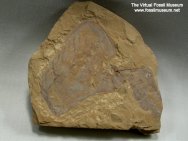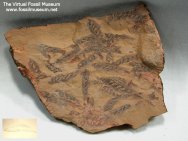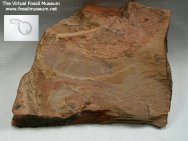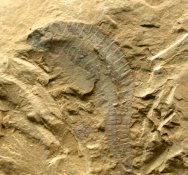 Vetulicolia
is a new phylum only recently erected by Shu, et al. (2001), who
posit that they were early deuterostomes. The body comprises of
two main parts, a large anterior section with large mouth with
a row of five oval features on each side that were interpreted
as gills, and a posterior section with seven segments, with a
constriction where the two main parts are joined (see Vetulicola
drawing to left). Shu (2003) later argued that vetulicolians are
a likely early, stem group of primitive deuterostomes, and from
this inferring that segments in cephalochordates and vertebrates
may be derived from the common ancestor of protostomes and deuterostomes.
They also suggested that Vetulicolians and Yunnanozoans may be
closely related, since Yunnanozoans also have a bipartite body
plan with a gill-bearing anterior and segmented posterior. More
often, the Yunnanozoans are considered primitive Chordates, the
Hemichordata,
but are included here to emphasize the controversy. The worm-like
genus Banffia is also included here as it resembles Vetulicolia
in its bipartite body, as does the recently described Skeemella
(Briggs et al., 2005). Both Banffia and Skeemella, however, have
way more posterior segments and no apparent gill openings. Briggs
described Skeemella from the Middle Cambrian
of Utah as having affinity to Vetulicolians as well having
phyllocarid arthropods (see this Utah phyllocarid),
which would preclude assignment of Vetulicolia to Deuterostomia.
Others have argued for placement in of Vetucolians in Urochordata.
At present, there is no agreement as to their systematic placement,
and thus Vetulicolia thus remain problematic.
Vetulicolia
is a new phylum only recently erected by Shu, et al. (2001), who
posit that they were early deuterostomes. The body comprises of
two main parts, a large anterior section with large mouth with
a row of five oval features on each side that were interpreted
as gills, and a posterior section with seven segments, with a
constriction where the two main parts are joined (see Vetulicola
drawing to left). Shu (2003) later argued that vetulicolians are
a likely early, stem group of primitive deuterostomes, and from
this inferring that segments in cephalochordates and vertebrates
may be derived from the common ancestor of protostomes and deuterostomes.
They also suggested that Vetulicolians and Yunnanozoans may be
closely related, since Yunnanozoans also have a bipartite body
plan with a gill-bearing anterior and segmented posterior. More
often, the Yunnanozoans are considered primitive Chordates, the
Hemichordata,
but are included here to emphasize the controversy. The worm-like
genus Banffia is also included here as it resembles Vetulicolia
in its bipartite body, as does the recently described Skeemella
(Briggs et al., 2005). Both Banffia and Skeemella, however, have
way more posterior segments and no apparent gill openings. Briggs
described Skeemella from the Middle Cambrian
of Utah as having affinity to Vetulicolians as well having
phyllocarid arthropods (see this Utah phyllocarid),
which would preclude assignment of Vetulicolia to Deuterostomia.
Others have argued for placement in of Vetucolians in Urochordata.
At present, there is no agreement as to their systematic placement,
and thus Vetulicolia thus remain problematic.
Shu defined Phylum Vetulicolia to comprise family
Didazoonidae with the genera Didazoon and Xidazoon, family Vetulicolidae
with the genera Pomatrum and Vetulicola, and genus Banffia. Chen
(2003) placed Yuyuanozoon magnificissimi in Vetulicolia.
The
Maotianshan shales known as Chengjiang
ranks as one of the most important Lagerstätten fossil
sites in the world, and the one with the most diverse faunal
assemblage. The Chengjiang site is located in the Yunnan Province
of China in the villages of Ercaicun and Chengjiang near the
city of Kunming. Some 50 meters of mudstone sediment are exposed,
yielded
many excellently preserved soft-bodied creatures of the Cambrian
Explosion. Dated at 515 million years ago, it lies midway
through Series 2 Epoch of the Cambrian
Period..
|
Vetulicolian
Fossils
|
|
A postulated taxonomy:
Phylum Vetulicolia
Class Vetulicolia
Order Vetulicolida
Family Vetulicolidae
Genus Vetulicola
Vetulicola rectangulata
Vetulicola cuneata
Vetulicola gangtoucunensis
Genus Banffia
Banffia constricta
Banffia confusa
Family Didazoonidae
Genus Didazoon
Didazoon haoae
Genus Xidazoon
Xidazoon stephanus
Order Yunnanozoa
Family Yunnanozoonidae
Genus Yunnanozoon
Yunnanozoon lividum
Genus Haikouella
Haikouella lanceolata
|
|
|
|
|
|
| |
|
|
| |
|
|
| |
|
|
|
| |
|
|
|
Chengjiang
References








